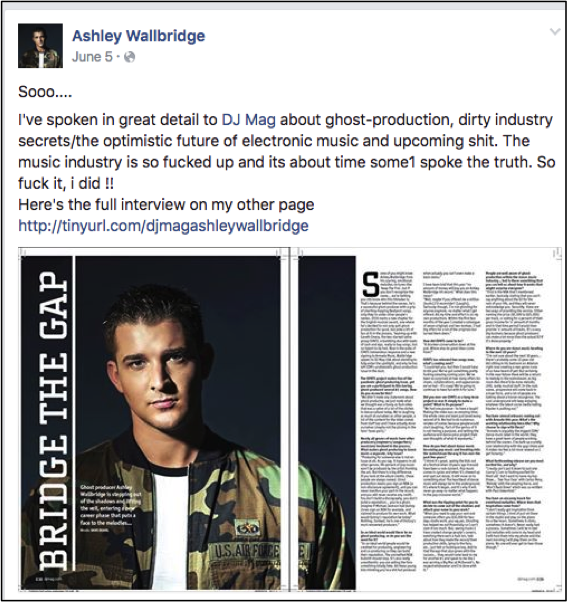#FeatureFriday #TMG #Ghost Production – A Closer Look
The term ‘ghost producers’ typically has a negative connotation in the music industry, yet it is apparent that more and more producers are finding lucrative opportunities in the field of ghost production. We recently came across an article on DJMag.com that features commentary from a former ghost producer, Ashley Wallbridge. They dive into his opinion on the matter, personal experiences and personal decision to forego the lucrative role in order to reaffirm his focus on his own career as a musician. For the full article, click here.
Ashley Wallbridge has produced countless melodies that have topped the Beatport charts under other people’s names. Though it’s a common practice in the electronic music industry, it still comes as quite a shock to fans that the production of their favorite track might not always come from the work of their favorite artist.

Emery and Wallbridge truly captured the irony and satire of this practice with their first official music video following their decision to collab on a project entiltled “CVNTS” where they poke fun at the idea that producers and DJs no longer need any talent to break into the scene and the idea that the life of a famous artist is that of jets, clubs, and glamour!
We recently sat down with TMG artist Dennis Sheperd to discuss this practice with him and get his opinion on the article and what this means for the electronic music community.

Q: What are your thoughts on ghost producers such as Wallbridge stepping out of that realm of music? Is the artist community open to these producers going from ghost production to focusing on their own music with their name?
A: I don’t mind ghost producers focusing on their own material instead. Why would I? However, I’ve known Ashly Wallbridge’s name for many years, even before he got affiliated with Garuda & Armada, and he has always been producing his own music next to doing ghost production. So actually, it isn’t such a big headline for me.
Q: Is it known throughout the artist community who are ghost producers? For example, aside from Wallbridge, do you know amongst yourselves who ghost produces tracks?
A: Usually ghost producers sign an NDA. But if you are friends with someone, you sometimes get background information. Plus, there are a lot of rumors. Once a guy admitted to me that he was producing for XYZ but I already knew beforehand because I could hear the similarity in the sound.
Q: The article talks about how songwriting/production credit is given in other genre. Do you think this should be adopted in the electronic music industry as well?
A: Songwriting and production credit is also given in electronic dance music, but not as often as it’s all “part of the negotiations”. But if you look close enough on sites like www.discogs.com, you can find other people involved in records that you would think are just done by that one artist. There’s also a huge difference between a DJ who just gets his stuff produced and someone who is producing on his own but needs help in getting their production to the next level. But usually you can’t read this information from just looking at the credits.
Q: When you said “there’s also a huge difference between a DJ who just gets his stuff produced or someone who is producing on his own but needs help in getting their production to the next level”, can you give me an example of this?
A: Ghost production is one extreme. A client gives you a track as reference and you just produce a new track in that direction on your own as the ghost producer. You might get some input and thoughts from the client, but that’s it. But sometimes you receive tracks from a client that have a great basic idea, but are only halfway finished and not on a professional level. If you bring that track to the next level, it’s not really ghost production anymore, but rather ‘studio engineering’. At least that artist had some or a lot of creative input in that case. For ghost production, you usually get very little or no input at all from the client. That’s what I meant by ‘huge difference’.
A big thanks to Dennis Sheperd for speaking with us on the topic! We hope to see more clarity on the matter as the dynamic of the industry continues to change! For more information on Dennis Sheperd, check out the following pages and look out for his up-coming tour dates in Canada:
- Facebook: https://www.facebook.com/dennissheperd/
- Twitter: https://twitter.com/dennissheperd
- Instagram: https://www.instagram.com/dennissheperd/
- Beatport: https://www.beatport.com/artist/dennis-sheperd/40551
- Soundcloud: https://soundcloud.com/dennissheperd


Leave a Reply